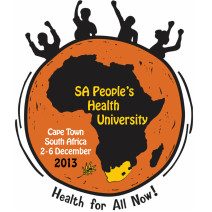
Region: Africa
Year: 2016
Source: material collected as part of the PHM global action-research project “The contribution of civil society organisations in achieving health for all”
Author(s): PHM South Africa
Summary: The idea to run a local South African People’s Health University annually arose from a discussion within the PHM‐SA steering committee, after the International People’s Health University (IPHU) was held in Cape Town in 2012, prior to the People’s Health Assembly 3 (PHA3). SAPHU’s have been held on an annual basis since the first SAPHU was held in December 2013. In evaluating the two SAPHUs held in 2013 and 2014 a mixed methods approach was used, including participant surveys, document analysis, qualitative interviews and focus group discussions. SAPHU has the potential to contribute to the building of a social movement for Health for All. To optimise the possibility of doing so, SAPHU needs to be part of a larger strategy; it needs to be more focused and to be closely linked directly to organisation and implementation. SAPHU needs to be less ambitious – in breadth and inclusiveness – and more ambitious in terms of what it might achieve in terms of its intended aims. The main thrust is to more closely link what participants learn with the possibility that they implement some of it as activists, as far as this is ever possible. To this end the recommendations address PHM-SA as an organisation, the structure of SAPHU, the recruitment and selection of participants; educational design and delivery, and logistics.
For more information on this experience, please write to [email protected].
Key practices: popular education, creative and interactive training, transferable skill-building

